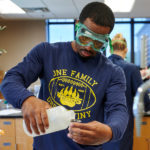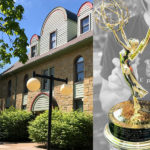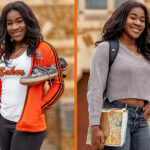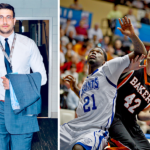For the thousands of student-athletes who have worn Baker Orange, collegiate athletics is more than competition. It provides lessons in discipline, teamwork, perseverance, accountability, and fair play. It builds relationships with teammates and coaches that contribute to success and self-confidence. (Read about current student-athlete Amy Kamtio’s Baker experience.)
As the university begins a three-phase $17 million capital project to enhance athletic facilities at the outdoor sports complex, Collins Center, and Mabee Gym, Wildcat alumni reflected on their student-athlete experience and the positive influence it continues to have on their personal and professional lives. (Read about the $2.12 million gift from Ross, ’70, and Christine Hartley for phase 1 of the project.)
Khadijah Lane, ’16
Three years after graduating with a degree in exercise science, Khadijah Lane became a doctor of occupational therapy, leading to her current position as an occupational therapist at Sante of North Scottsdale in Arizona. Academics, on-campus activities, and track provided a well-rounded experience at Baker.
“The academics side truly influenced me as my mentors in the exercise science department pushed me to find my niche in becoming an OT and considering what I could bring to the field. Though being a student-athlete helped me reach many of my personal goals, my entire experience and all of my support systems led me to where I am today,” Lane said. “I continue to rely on my connections at Baker, those who helped me build my foundation for being a health care worker. Especially in our world’s climate, I am so grateful for the academic, leadership, and athletic maturity I gained attending Baker, as I feel as though the sky is the limit.”
Lane set school records in the 400-meter dash and 600-meter run and received All-America honors as a freshman. For her efforts, she was honored at a home Baker football game during her sophomore year.
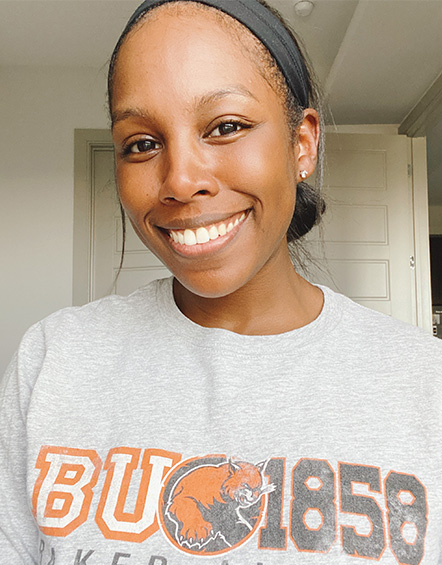
“I was recognized along with the Hall of Famers being inducted that year, and I remember receiving a pat on the back and handshakes from some of the most impressive athletes and successful persons to attend Baker,” Lane said. “It was an impactful moment and really pushed me to work harder on the track and in the classroom.”
Through athletics, Lane learned the value of setting high standards. She also realized the value of listening to her supporters.
“I grew up with low self-confidence and never considered that athletics could take me very far. Being a track and field athlete is nearly 98 percent mental and 2 percent talent. The hard work and effort were actually very easy for someone like me to put in. It was the belief in myself and my dedication that required more energy, along with the consistent knowledge that my coaches and teammates were there to support me. Today, I invest in myself, my career, and my patients because I know from experience the outcome that it will bring,” Lane said.
The work ethic has carried into her professional life.
“I finally realize the value that is going the extra mile—runner’s pun intended—knowing that the victory and rewards that come from that hard work will ultimately pay off,” she said.
The relationships with her fellow runners and coaches inspired her. The members of her first relay team became great friends she could rely on, and her coach, the late Zach Kindler, pushed her.
“Coach Kindler pushed me beyond my comfort zone, which allowed me to grow academically in turn. He made it very clear that if I didn’t have the strong academics to match my talent athletically I couldn’t compete, and that’s what it was all about for me. Those relationships were foundational and impactful for having my very first support system of many at Baker. I ultimately grew stronger as a teammate when I reciprocated my support at every meet, conference, and nationals experience, growing my love for my events and those who loved track and field as much as I did,” Lane said.
Lane also believes in the importance of developing and maintaining high-quality athletic facilities.
“I personally believe that where you spend your days practicing for your event or events makes a world of difference for how you perform at competitions and meets,” she said. “I do believe more investment in the facilities and tools that our student-athletes use can truly create for a unique and upgraded experience, making it motivational to excel in the classroom in order to compete and care for said facilities. Additions and upgrades to athletic facilities add quality and individuality, demonstrating the confidence in the ongoing investment in student-athletes. It also adds an aspect of appeal to visiting and potential student-athletes who are considering making Baker their new home for the next few years.”
Liesel Kirk-Fink, ’02
Athletics at Baker provided distance runner and future Baker Hall of Famer Liesel Kirk-Fink opportunities to push herself physically and mentally. During her senior year, she and her team had their eye on winning the Heart of America Athletic Conference outdoor meet. The coaching staff challenged Liesel to compete in six events in two days: 1,500 meters, 800, 10,000, 3,000, 4×800, and the 4×400.
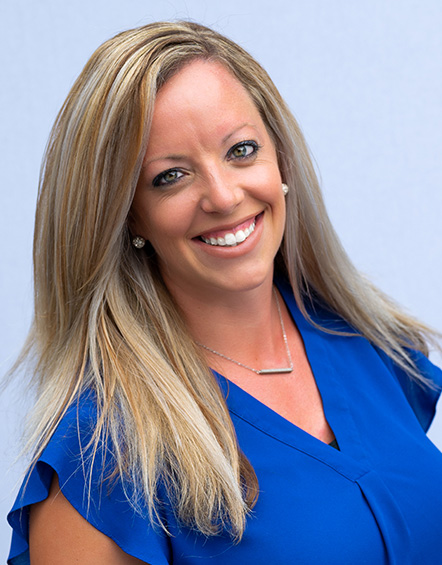
“It was grueling, but I followed through with his request for me to get second in four events. I still remember the 10,000 meters, running it in the dark. And my teammates asking me from the bus to run faster was more than motivating,” recalled Kirk-Fink, who became an NAIA All-American.
Attending a private university provided incredible experiences for Kirk-Fink, who was also active with Alpha Chi Omega and parMentors, a student leadership group. She remembers participating in student-athlete events with other NAIA universities in the Midwest and receiving handwritten letters from President Daniel Lambert. And she will never forget former Athletic Director Dan Harris and former Dean of the School of Education Peggy Harris leaving their front door open for Wildcat runners and offering them chili after the Maple Leaf Festival.
As a student-athlete, Kirk-Fink always made sure to hold herself accountable to her academic and sports responsibilities.
“You made sure you completed your priorities as there was not time later. That intensity carried over into my career and helps me every day to not put off to tomorrow what should be done today. I believe the work ethic I was taught at Baker both in the classroom and in running is felt by my repeat and referral customers and is why I am successful today,” said Kirk-Fink, now a broker associate at Kirk and Cobb, a realty company in Topeka, Kansas.
The connections with coaches and teammates helped prepare her long after her Baker competitions ended.
“Coaches always reminded us that we all are guaranteed to have an off day, and that’s when teammates need to lean on each other the most. That’s absolutely helped me in my career, marriage, and motherhood. Our coaches were like parents. We needed them to support, encourage, and remind us of what we could do. We needed the accountability, and their words mattered,” she said.
Patti Phillips, ’88
As CEO of Women Leaders in College Sports for 11 years, Patti Phillips still applies the lessons she learned more than 30 years ago as a four-year starter in basketball and graduating with honors in English education and psychology. A 2011 Baker Hall of Fame inductee, Phillips takes pride in overseeing a premier leadership organization, headquartered in Kansas City, Missouri, that develops, connects, and advances women working at the collegiate level.
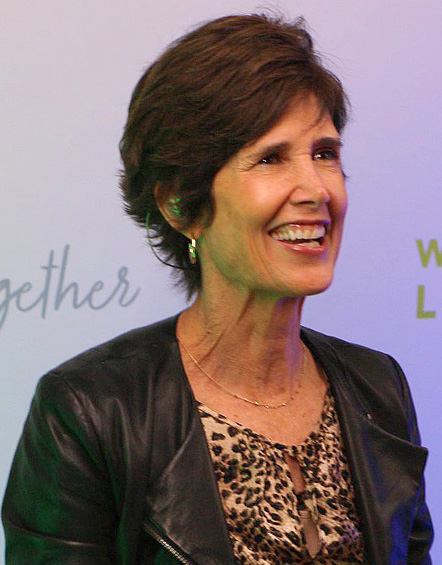
“Baker holds a dear place in my heart and life. I learned balance, teamwork, resiliency, and how to both win and lose. All are lessons I use every day leading a national organization.”
For her entire professional career, Phillips has been a big believer in the power of relationships and adhering to the “you are who you surround yourself with” mantra. Oftentimes, the college experience factors into that development.
“It has actually been proven that one can determine your wealth, health, and success by your associations. And some of our foundational relationships are built in college. That is why a university that is a fit with your values and aspirations is critical because it will attract like-minded people for you. Baker was that for me. I cherish my friendships from college, and the professors and coaches that helped mentor me through the years,” she said.
One of Phillips’ fondest memories was the lasting impression basketball coach Chris Haines had on her life.
“I so appreciated her dedication to our team, her intensity, but also her optimism, in general,” Phillips said. “She had a great energy about her that definitely enhanced my playing experience.”
Phillips played basketball soon after the Collins Center was unveiled on campus.
“Facilities have a huge impact on pride and confidence,” she said. “The new basketball arena opened my sophomore year, and it was game changing for me and my teammates. We absolutely loved it. Facilities have a huge impact on recruiting as well,” she said.
Alex Baird, ’16
A member of three conference championship teams, Alex Baird took pride in being a part of a resurgence of Wildcat football.
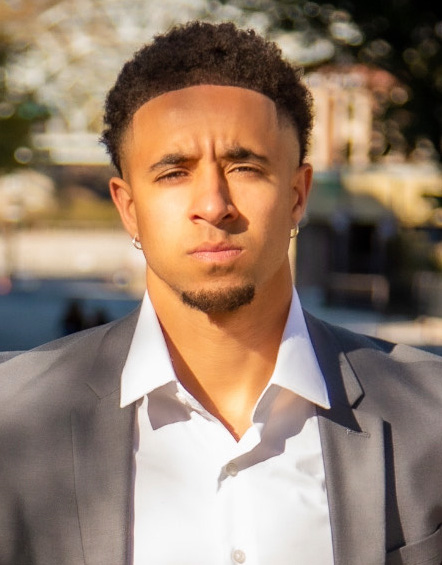
“Prior to the arrival of my class, we hadn’t accomplished winning a conference title in quite some time. It felt amazing to be a part of that culture shift. The energy and expectation we built for the football team moving forward has seemed to leave a lingering impact.”
The discipline Baird developed as a student-athlete contributed to success after Baker, especially as he earned a doctorate in occupational therapy and became a business owner.
Balancing his time as a student-athlete on the Baldwin City campus prepared him well.
“Discipline and consistency are the two most valuable characteristics to have when pushing to accomplish something. This has come to stay true as it is also the foundation of what I preach to my clients,” said Baird, who owns BodsByBaird Personal Training in Overland Park, Kansas. “Having discipline and consistency is so important because it helps create a habitual lifestyle in that even on the days you are not feeling the most motivated, you will still find a way to get it done.”
Forming lifelong relationships with teammates and coaches boosted Baird’s Baker experience. Spending four years with the same group left a lasting impression.
“Many times these are the relationships that help shape your character and who you are as a growing adult,” he said. “During college you are in a big period of self-growth and finding the best version of you, so these relationships are key to helping you find success on and off the field.
Former assistant coach Jason Thoren, now the head coach of the football team, had a tremendous influence on Baird.
“Coach Thoren and I had a solid foundation in our relationship during my time at Baker. He was one of the first coaches to take a chance on me and truly has the best interest in his players both on and off the field,” Baird said.
Baird fondly remembers Saturdays playing at Liston Stadium. It was also a popular venue to showcase to prospective students during campus tours.
“Quality facilities are key for student-athlete success in many different scenarios,” he said. “Being able to display high-quality and clean equipment to potential future students is an empowering experience and can help separate interest from other universities. Secondly, athletes’ desire to train harder and more frequently may improve as the quality of the equipment does. This works similarly in any gym-selection environment, a home or apartment selection. The amenities play a role in your commitment.”
Kristy (Thrasher) De La Cruz, ’96
Kristy De La Cruz competed at a high level in the mid-1990s, winning the individual Heart of America Athletic Conference cross country title in 1995 and leading the Wildcats to the team championship and a qualifier for nationals. She continues to run, having raced in more than 100 marathons, including ultramarathons in New York, Philadelphia, and Vermont. In 2006, she was named the NYC Ultrarunner of the Year. De La Cruz also placed second for women in a Vermont 100-mile race in 2005.
Her passion for distance running was sparked at Baker and has contributed to her success as Community Superintendent of District Four, East Harlem, New York.
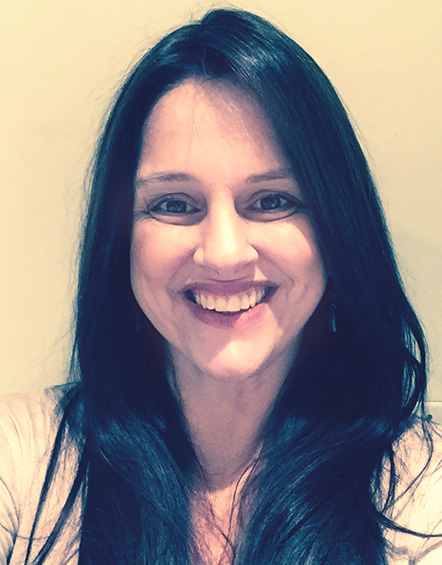
“Some of the life lessons I learned was the ability to take feedback, to build mental stamina, and to persevere. All of these lessons that I learned through running are applicable to both my personal and professional life. As an educator, I must constantly listen and act upon feedback for the sake of our children and the needs of our community at large.”
Her Baker coach, Dennis Weber, inspired her to continue to run, allowing her to travel throughout the United States to compete.
“Coach Weber opened up his home and family to me, which was essential when being new to the Baker community. To this day, I can hear Coach Weber say, ‘You always have 30 percent more than you think.’ I still hold that mantra today,” De La Cruz said.
Scott, ’03, and Molly (Humphries), ’03, Hughes
Scott and Molly met at Baker, running track and training together as part of the same distance group. They learned how to manage their time balancing academics and athletics.
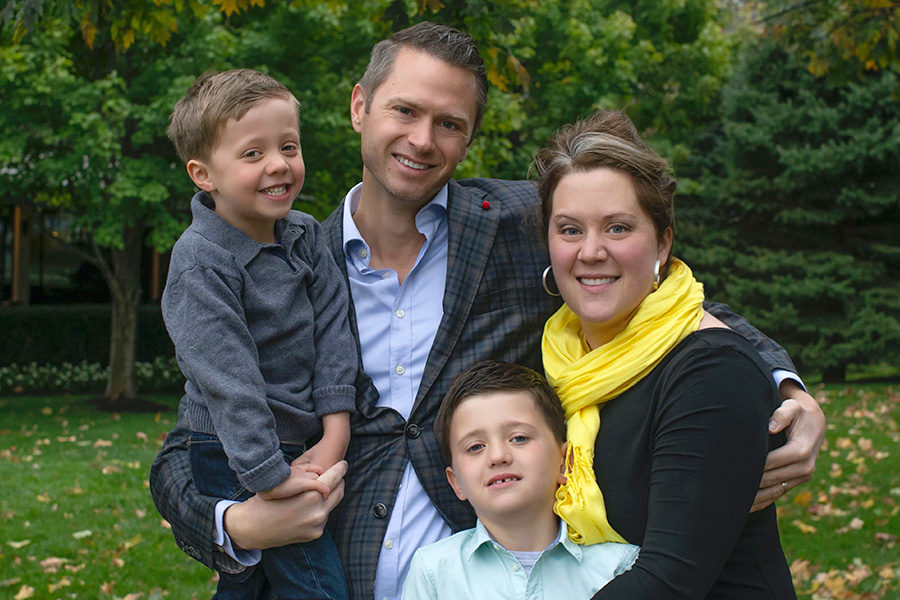
“As a student-athlete, you have to learn to handle your academics, activities, and commitment to your team. Knowing that you have two less hours in the evenings because of practice and then entire Saturdays devoted to track meets means that study time, Greek time, etcetera, have to be scheduled around athletics,” said Molly, an environmental scientist at Burns & McDonnell, in Kansas City.
For Scott, a partner at KPMG, a Big Four accounting organization in Kansas City, the lessons learned as a Wildcat included becoming more disciplined and developing a positive lifestyle.
“Pushing my limits, setting me up for the rigorous challenges and commitments after graduating, and maintaining fitness in your first years of independence set you up for good life habits,” he said.
Scott and Molly will always remember the relationships built with coaches and teammates during training sessions and riding to competitions in the Midwest in a 15-passenger van.
“It is imperative to have good relationships with fellow teammates and coaches to make the wheels go around,” Molly said.
They remain in contact with their teammates to this day.
“Many of our friends still see each other today even though we’ve spread out across the country. When I was in New York City before the pandemic, four of us from our 4×800-meter group connected for dinner and drinks. It was like no time had passed,” Scott said.
Credits:
Written by Steve Rottinghaus, '14 MSM





